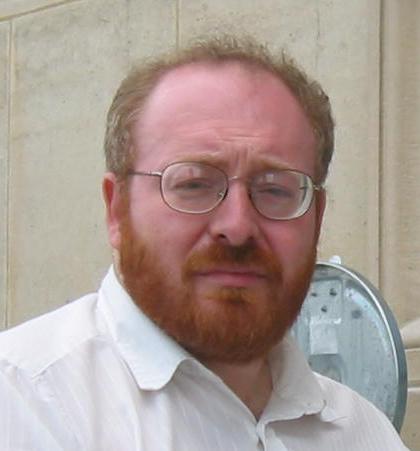 Boris Veytsman
Boris VeytsmanFrom Barbara Beeton for the TUG election committee:
Nominations for TUG President and the Board of Directors in 2017 have been received and validated.
For President, Boris Veytsman was nominated. As there were no other nominees, he is duly elected and will serve for a two-year term. Congratulations Boris!
For the Board of Directors, the following 14 individuals were nominated (the order of presentation was determined by lot): Will Robertson, Herbert Schulz, Karl Berry, Klaus Höppner, Michael Sofka, Enrico Gregorio, Frank Mittelbach, Steve Peter, Herbert Voß, Kaja Christiansen, Arthur Reutenauer, Johannes Braams, Ross Moore, Taco Hoekwater.
There were more Board nominations than open positions. Thus, an election ballot is required, in accordance with the TUG election procedures.
Details of vote timing: electronic votes will be accepted until one minute after 23:59 UTC on April 9, that is, through the end of April 9, UTC. Votes submitted after that time will not be counte, even if it is still April 9 in your time zone. As for paper ballots, since April 9 is a Sunday, in practice they must be delivered by or on April 8 to be counted.
Terms for President and new members of the Board of Directors will begin with the Annual Meeting.
Announcements and information about previous elections are available, along with the notice for this election, and the roster of current and past board members: 2015, 2013, 2011, 2009, 2007, 2005, 2003, 2001, 1999, 1997.
The following candidates' statements were received for the present election, and will be printed in TUGboat 38:1. The candidate information as a PDF is also available.
 Boris Veytsman
Boris Veytsman(Candidate for TUG President.)
I was born in 1964 in Odessa, Ukraine and have a degree in Theoretical Physics. I worked for various sci-tech employers, including TeX consulting for Google and contractor work with NASA. At present my main work is in aviation safety with Harris Corporation. I teach and do research at George Mason University. I also do TeX consulting for a number of customers, including FAO UN, US Government agencies, universities and publishers worldwide. My CV is at http://borisv.lk.net/cv/cv.html.
I have been using TeX since 1994 and have been a TeX consultant since 2005. I have published a number of packages on CTAN and papers in TUGboat. I have been a Board member since 2010 and Vice-President since 2016. I am an Associate Editor of TUGboat and support http://tug.org/books/.
Over the years I have done some thinking about the future of TeX Users Group. In the old days if you wanted tapes with TeX distributions or sought help, you joined TUG. Now things have changed: you easily can download any distribution or ask questions. Thus the steady decline in our membership. While TeX is used by many people, TUG is shrinking.
If we want to remain relevant, we need to consider our role in the new user community. I think there are several areas where TUG is needed:
We should remember that we serve not just our members, but the wide community of TeX users. We should actively promote TUG among the community and make easier the option to support TUG by volunteering or donating.
I think we need to work to be relevant in the changing world. If the TUG members trust me to lead this effort, I would be greatly honored.
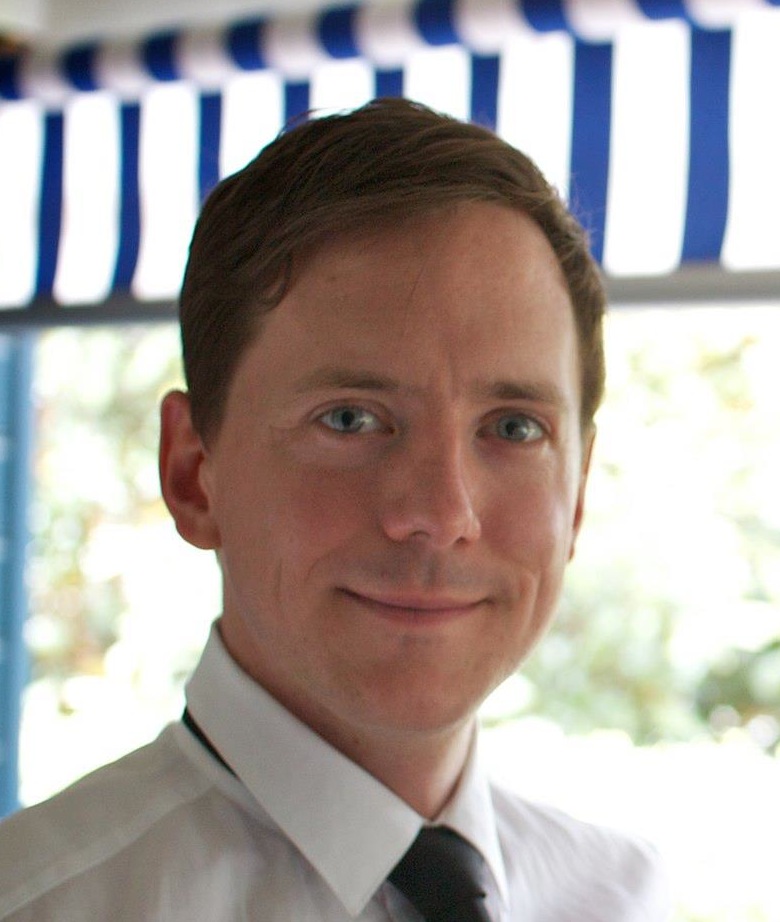 Will Robertson
Will Robertson(Candidate for TUG board of directors.)
My background is mechanical engineering, and having (finally) completed my PhD in magnetic levitation and vibration control in 2013, I am now a full-time lecturer at The University of Adelaide. My interest in LaTeX was preceded by an interest in computer typesetting, and I came into LaTeX in the midst of a general transition to Unicode. Early in XeTeX's life I wrote some LaTeX code to aid the font-loading process, and from there I became hooked and developed a number of LaTeX packages, including fontspec and unicode-math. After some time I also became a member of the LaTeX3 project, helping to develop the expl3 programming language.
Although my day-to-day programming contributions have diminished in recent years as my personal and professional responsibilities have increased, my passion and appreciation for TeX in all its forms only increases with the years. Personally, I see TeX as the only typesetting system worth using for most forms of document production, although I'm happy for people to hold their own opinions on the matter. I teach LaTeX to our entire mechanical engineering honours project student cohort, and every year I have overwhelmingly positive feedback on both its style and utility over what they're used to.
As a member of the TUG Board of Directors, I would seek greater recognition for TeX from the world's universities and technical companies. Recognition by way of TUG membership, of course, to allow the TUG organisation to flourish. In addition, I would seek initiatives for younger users and developers to engage with TUG, with an emphasis on open discussion with the number of companies that now sell access to their online TeX editors and document previewers.
I believe that my immersion in the current technical landscape of TeX and friends gives me a view of the TeX world that is both broad and deep. I would not sit on the TUG Board as a LaTeX3 developer, but rather as one who has a great wish to see success across the whole TeX world, from ConTeXt in its technical mastery, to eplain in its hackability, to LaTeX in its rich ecosystem. TeX has a bright future, and it would be an honour to contribute to that future as a member of the TUG Board.
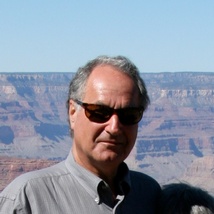 Herbert Schulz
Herbert Schulz(Candidate for TUG board of directors.)
I've been using TeX since the mid-1980s; well, except for several years in the mid- to late-1990s. During that time period I received a great deal of help from others as I tried to better understand the subtleties of using TeX, and later LaTeX. After retiring in 2001 I decided to give back to the community and have helped put together MacTeX as well as MacTeXtras as well as help others on multiple (both Mac and non-Mac centric) on-line forums and email lists.
I would like to become a member of the TUG Board to further help develop on-line help through the TUG Web Pages by gathering links to as many on-line and up-to-date TeX, LaTeX and Distribution help locations along with descriptions of what they provide. I believe this would be one way to help increase TUG membership and speed up the learning curve for new users of TeX.
 Karl Berry
Karl Berry(Candidate for TUG board of directors.)
TeX biography: I served as TUG president from 2003-2011 and was a board member for two terms prior to that, and also subsequently. I am running again for a position on the board.
I co-sponsored the creation of the TeX Development Fund in 2002. I'm one of the primary system administrators and webmasters for the TUG servers, and the production manager for our journal TUGboat.
On the development side, I'm currently the editor of TeX Live, the largest free software TeX distribution, and thus coordinate with many other TeX projects around the world, such as CTAN, LaTeX, and pdfTeX. I developed and still (co-)maintain Web2c (Unix TeX) and its basic library Kpathsea, Eplain (a macro package extending plain TeX), and other projects. I am also a co-author of TeX for the Impatient, an early comprehensive book on plain TeX, now freely available. I first encountered and installed TeX in 1982, as a college undergraduate.
Statement of intent: I believe TUG can best serve its members and the general TeX community by working in partnership with the other TeX user groups worldwide, and sponsoring projects and conferences that will increase interest in and use of TeX. I've been fortunate to be able to work pro bono on TUG and TeX activities the past several years, and plan to continue doing so if re-elected.
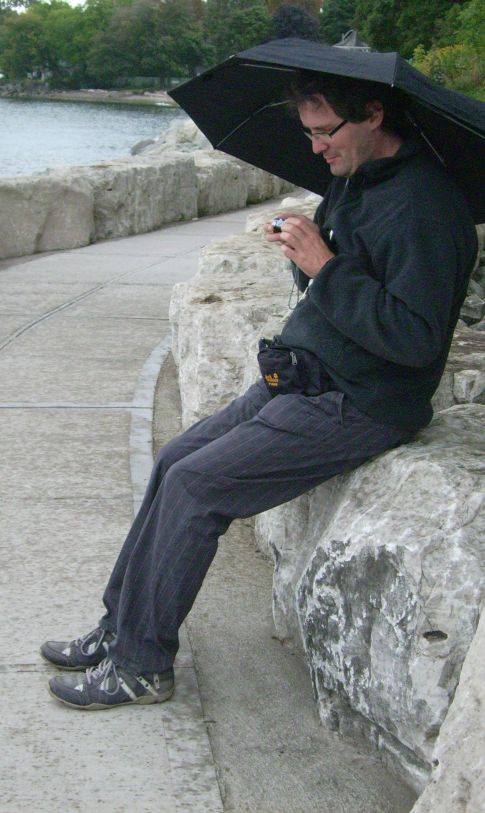 Klaus Höppner
Klaus Höppner(Candidate for TUG board of directors.)
Biography: I got a PhD in Physics in 1997. After several years in the control systems group of an accelerator center in Darmstadt, I've been working at an accelerator for cancer therapy in Heidelberg. My first contact to LaTeX was in 1991, using it frequently since then.
I have been preparing the CTAN snapshot on CD, distributed to the members of many user groups, from 1999 until 2002. I was the local organizer of TUG2015 and was heavily involved in the organization of several DANTE conferences and EuroTeX 2005. I've been a member of the TUG board since 2005 and was a member of the DANTE board until 2016, including terms acting as president, vice president, and treasurer.
Statement: As in the past, I want to be the voice of European users, in particular those who need characters with funny accents. TUG's last year was troublesome. The board had to make a hard decision. It's up to you to decide whether it was right or wrong. Anyway, we have to look forward, coming back to a stable and constructive cooperation. TUG has an efficient office and a well-working board, against all blames. Looking at other user groups, that's not too common.
Renovation was an often mentioned goal regarding TUG. Renovation is fine, it just has to be performed by working with the developers of TeX distributions and maintainers of TeX repositories and web sites, not by blaming them for the work they do in their spare time. I've seen many improvements in the past, regarding the installation process of TeX distributions (e.g. TeX Live) and in the user interface of CTAN. The rather plain and simple layout of TUG's web pages may be improved, of course giving the usability, especially for handicapped, the precedence over fanciness. However, the key information is there. The TeX community needs volunteers instead of hot-air merchants. And the TUG board needs constructive directors. I think the TUG conference and AGM in Toronto created the base for a new start that shouldn't be spoiled.
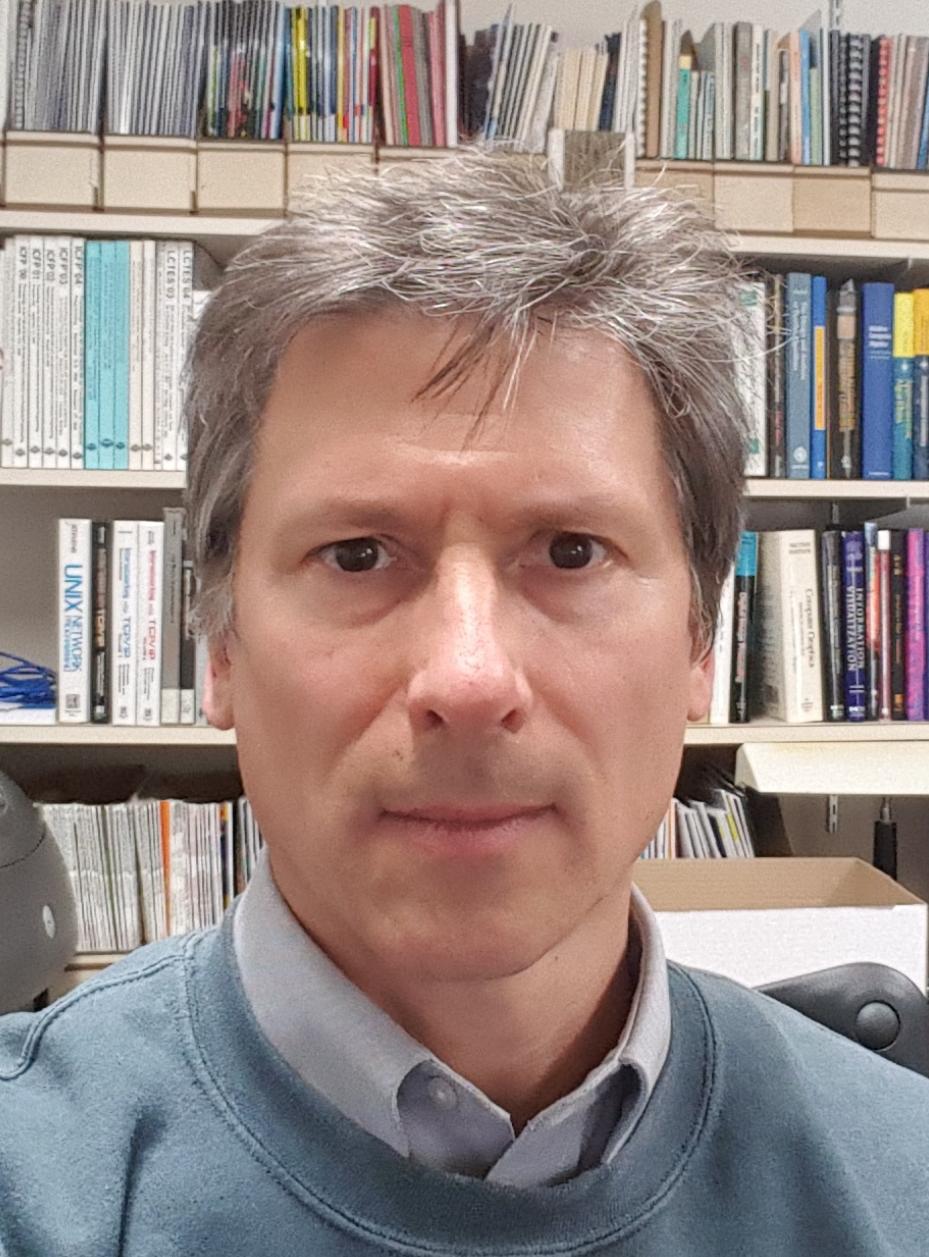 Michael Sofka
Michael Sofka(Candidate for TUG board of directors.)
Biography: I have been a TeX user for nearly 30 years, and a member of TUG for 28 years, including a term on the Board (2001-2005). My use of TeX started as a programmer for a full service typesetting company writing macro packages for books, device drivers for various laser typesetters. I continued using TeX and LaTeX in my work and personal life after switching to IT in Academia. During this time TeX and LaTeX have changed tremendously, and I am continually amazed by the creativity of the TeX community. It is no exaggeration to say my continued interest and membership in TUG derives from the delight of discovering new tools and techniques for traditional and electronic publishing.
Statement: TeX and TUG have come a long way from the days of half-inch tape distribution, CWEB, and the Berkeley Pascal compiler. The typesetting engines available have expanded and grown, and become far easier to install. The ways in which people find information about TeX has also changed. When I joined TUG I was desperate for quality information. Through TUGboat articles, and many readings of The TeXbook, I learned how to program and write using TeX. Today, the World Wide Web, through sites such as StackExchange, has become the first source of information. Most people who use TeX and LaTeX might not even be aware of the TeX Users Group, and the role it plays in funding and promoting the programs and packages they depend upon. Going forward, TUG will grow and adapt to this new way of sharing information, and explore new methods of attracting TeX users, whether it be through Web pages, sponsoring development, annual meetings, or local conferences. I hope you will support me in being a part of that process.
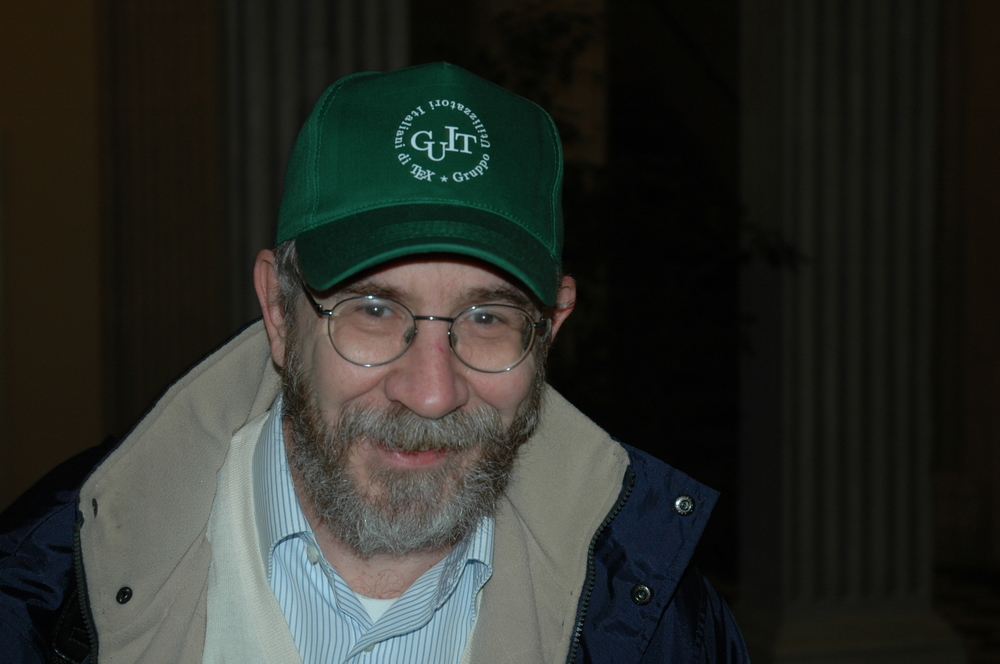 Enrico Gregorio
Enrico Gregorio(Candidate for TUG board of directors.)
Biography: I am associate professor of Algebra since 1992, currently at the University of Verona (Italy).
I'm active in TeX related matters since I started loving it, which was around 1986. I'm the author of a LaTeX programming book in Italian and a member of GuIT, the Italian TeX users group, which I also served as president and board member.
Since 1996 I deliver a LaTeX course at my Department, which is academically recognized and grants two credits to students who follow it and get their assignments approved.
I am quite active at the tex.stackexchange.com site, being the highest reputation member, with the nickname egreg and also in the GuIT forum as egreg9.
I have authored some LaTeX packages and papers for TUGboat and ArsTeXnica.
Personal statement: My main interest for the TeX world is in developing good documentation and in promoting good style in document writing and programming.
Supporting LaTeX3 development should be one of the important tasks for TUG in the next years.
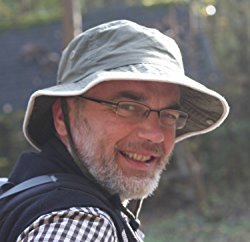 Frank Mittelbach
Frank Mittelbach(Candidate for TUG board of directors.)
I came in contact with TeX in the mid-eighties and over the years TeX, LaTeX and typography in general became a very important part of my life. In 1990 I took over the maintenance and further development of LaTeX from Leslie Lamport and together with a small number of people (most notably David Carlisle, Chris Rowley and Rainer Schöpf at that time) we designed and implemented what became LaTeX2e in 1994—the LaTeX you still essentially use today (even though it has undergone smaller modifications and improvements through by now 25 further releases).
Despite all predictions made during the last decades, TeX and LaTeX are alive and kicking as proven by their (still?) strong use in various ways around the world.
Nevertheless the world has changed and is changing further and in that changing world user groups like TUG need to find their place and possibly reinvent themselves by redefining and reshaping their role. With my work on the TUG board I would like to help in that process and ensure a future for high quality typography as provided by TeX.
 Steve Peter
Steve PeterBiography: I am a linguist and publisher originally from Illinois, but now living in New Jersey. I first encountered TeX as a technical writer documenting Mathematica. Now I use TeX and friends for a majority of my publishing work, and work with several publishers customizing TeX-based publishing systems. I am especially interested in multilingual typography and finding a sane way to typeset all of those crazy symbolisms linguists create. As if that weren't bad enough, I also design typefaces. (Do I know lucrative markets, or what?)
I got involved in TUG via translations for TUGboat. I was on the TUG board of directors for several terms before becoming TUG president in 2011, serving two terms, after which I returned to the board.
Statement: The future of TeX and TUG lies in global communication and cooperation to promote and sustain the amazing typographic quality associated with TeX and friends. Projects such as LuaTeX show that there remains a dynamic and bright future for our preferred typesetting system. I am especially interested in having TUG support projects (technical and artistic) that will serve to bolster TeX and TUG's visibility in the world at large.
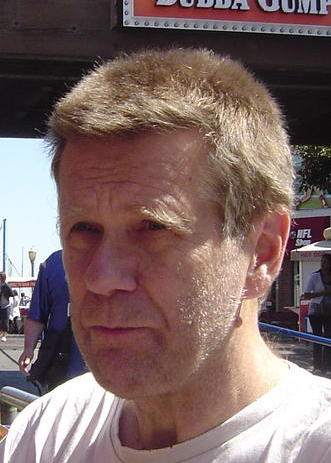 Herbert Voß
Herbert Voß(Candidate for TUG board of directors.)
I am retired from my job as a teacher for physics, mathematics and computer science at a so-called Gymnasium (higher education school), led by the Jesuit order. For more than ten years I am also a lecturer at the Free University of Berlin. I started with one course per year in scientific writing with LaTeX and have now eight courses per year.
I like reading and writing and created together with the publisher Lehmanns Media the so-called DANTE Edition, (La)TeX books from members for members of DANTE, the German speaking TeX user group. For DANTE's 25th anniversary I created a new edition of Victor Eijkhout's book TeX by Topic which was also published in the DANTE series.
I am very interested in creating an ebook from a LaTeX source, which is, of course, still not really easy. And my other major interest is “LaTeX for beginners”: how can one minimize the problems of the installation of a TeX distribution and the troubleshooting when running (La)TeX on source documents.
Statement: I still believe that TeX has a future. With LuaTeX we have a great potential to keep TeX running and I think that TUG can play a major role to make this public to the rest of the world.
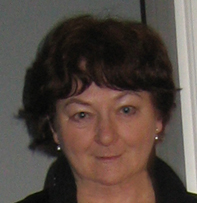 Kaja Christiansen
Kaja Christiansen(Candidate for TUG board of directors.)
I was born in Warszawa, Poland and live in the city of Aarhus, Denmark. I heard about TeX for the first time in the fall of 1979. In Palo Alto at the time, I wanted to audit courses at Stanford and my top priority was lectures by Prof. Donald Knuth. That, I was told, was not possible as Prof. Knuth was on leave due to work on a text processing project… This project was TeX! Back home, it didn't take long till we had a runnable TeX system in Denmark.
I have served as a Board member since 1997, co-sponsored the creation of the TeX Development Fund and have been the chair of TUG's Technical Council since 1999. I am also a member of the Bursary and Election committees and served as TUG vice-president from 2003-2011. I share system administrator's responsibilities for the TUG server and TUG's web site, and actively contributed to several earlier versions of TeXlive. Finally, I am a board member of the Danish TeX Users Group (DK-TUG) and served as the president of DK-TUG in 2002-2011.
Statement: TeX and friends are the only software I know of that, after 30+ years, is not only alive and well, but also the best typesetting system to produce beautiful books and papers. In my rôle as a member of the board, my special interests have been projects of immediate value to the TeX community, among them system administration, TeX Live and TUGboat.
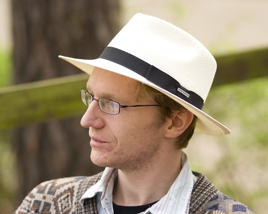 Arthur Reutenauer
Arthur Reutenauer(Candidate for TUG board of directors.)
Biography: I first joined TUG in 2005 and have been a member of the board for the past four years. My interest in TeX started during my university years when, being a student of mathematics and physics, I had to use it for typesetting reports. I was prompted to dive deeper because of my interest in languages and writing systems, and soon got passionate about it (see my entry in the TUG interview corner for excruciating details).
Statement: Today, I am active in TeX development as the maintainer of various packages and programs related to multilingual typesetting (polyglossia, hyph-utf8, XeTeX), and I regularly give talks at conferences and write articles in journals. I have been on the board of several TeX users groups, founded the ConTeXt group, and have contributed to promoting TeX which in my opinion is, still today, one of the best typesetting systems available. I am truly amazed at how vibrant our user community is.
If I am reelected to the TUG board, I will do my best to represent that community in all its diversity. Our organisation has been through some hard times recently, and I want to help moving forward and foster the use of TeX and Metafont in the 21st century.
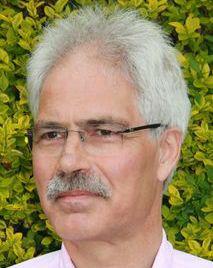 Johannes Braams
Johannes Braams(Candidate for TUG board of directors.)
Biography: I encountered TeX and friends sometime around 1985 when it was installed on our research VAX. It didn't take long for me to get hooked on LaTeX and I started to think about and work on multilingual support, later to be known as babel. Besides that I have been active on quite a number of activities:
Statement: In the last couple of years I have been coming back into the TeX-community. I would very much like to serve this wonderful community by taking up a role in the board of directors of TUG. I think TeX should and will be alive and well for many years to come, as the quality of typesetting that can be achieved by using TeX is still unsurpassed.
 Ross Moore
Ross Moore(Candidate for TUG board of directors.)
I would like to offer my services to the TUG Board. Having been active in the TeX community for more than 20 years, writing code for packages, my first TUG meeting was in 1997. Previously I've been a board member, but have taken a rest these past 2 years. In January, Boris asked if I'd be willing to return; I was happy to say ‘yes’.
Well, 2017 is likely to be a very important year for the PDF format, hence for TeX, and for TUG and other user groups around the world. Already on 18 January, a document “Information and Communication Technology (ICT) Final Standards and Guidelines” was published into the US Federal Register, effectively becoming law. This affects “standards for electronic and information technology developed, procured, maintained, or used by Federal agencies covered by section 508 of the Rehabilitation Act of 1973, as well as guidelines for telecommunications equipment […]. These revisions […] are intended to ensure that information and communication technology covered by the respective statutes is accessible to and usable by individuals with disabilities.” It specifies that “authoring tools capable of exporting PDF files must conform to PDF 1.7 […] and be capable of exporting PDF files that conform to PDF/UA-1.”
While documents produced by TeX-based software are compatible with PDF 1.7, it is certainly not the case that they conform to PDF/UA, which requires producing ‘Tagged PDF’. Thus if LaTeX or other TeX-based software can be used within US government agencies only as part of a processing chain requiring other software to complete the final document. This is not how we normally work with TeX. Furthermore, the PDF 2.0 standard, also based upon ‘Tagged PDF’, may appear as early as June.
Over the past 8 years (or more), I have given talks at annual TUG meetings, demonstrating PDF features that tagging allows, produced using an extended version of pdf-TeX. Currently I'm working on a set of LaTeX macros that produce valid ‘Tagged PDF’ documents satisfying the WCAG 2.0 Accessibility standard. Examples, using different LaTeX document classes and built with the current pdfTeX, can be found on my web page. These developments need to be enhanced to become de rigeur for the way we use TeX and LaTeX, else there will be no new TeX users in years to come. As a Director of TUG, this outlines an agenda that I'll be supporting.
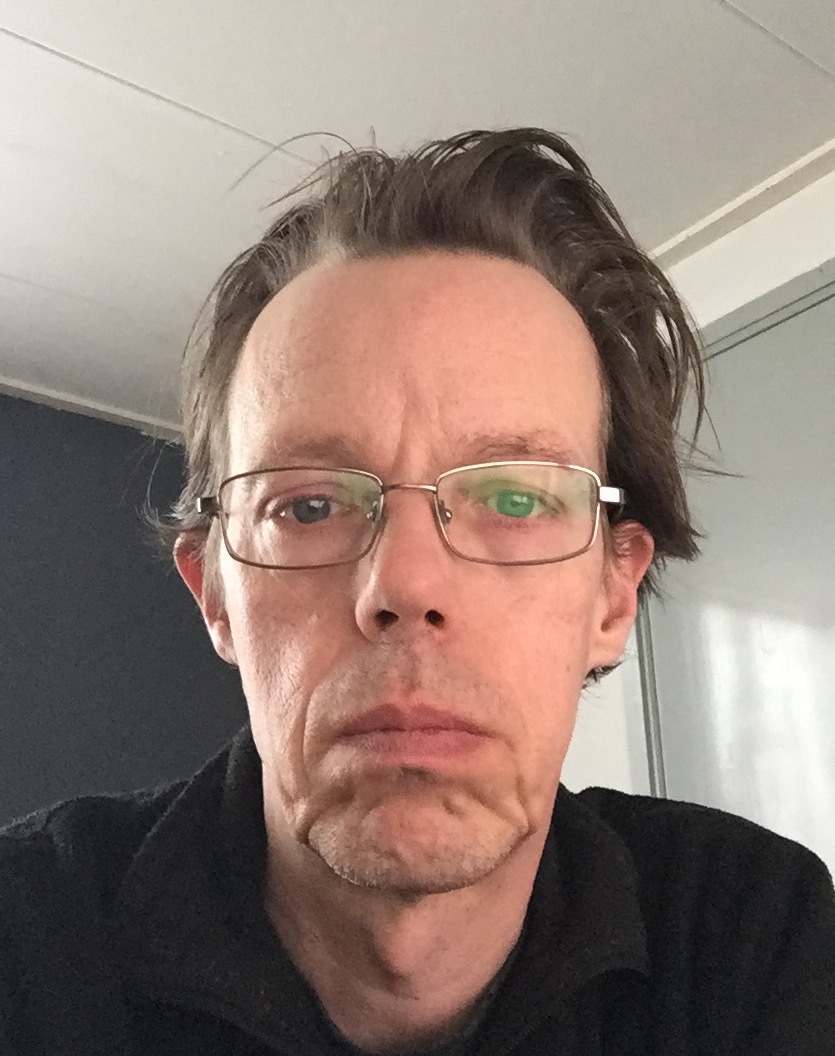 Taco Hoekwater
Taco Hoekwater(Candidate for TUG board of directors.)
TeX biography: Taco Hoekwater (born in 1969 in Netherlands) has been a ConTeXt user for two decades. He has been the first user of ConTeXt outside of PRAGMA ADE and works in tight cooperation with Hans Hagen to develop TeX engines and macros for ConTeXt ever since. He has been the president of the Dutch language-oriented TeX users group (NTG) from 2009 until 2015 and was the main editor of the NTG's magazine MAPS. He has been the maintainer of MetaPost for a number of years and a core participant in the LuaTeX development team. He organised the first international ConTeXt User Meeting in Epen, Netherlands in 2007, and various other TeX- and ConTeXt-related conferences since. He was previously on the TUG board from 2011 to 2015, and is the current president of the ConTeXt user group (CG).
Statement of intent: As a board member, I hope to be able to promote future extensions and applications of Knuth's amazing piece of software, as well as raise awareness of ConTeXt outside its current user base.